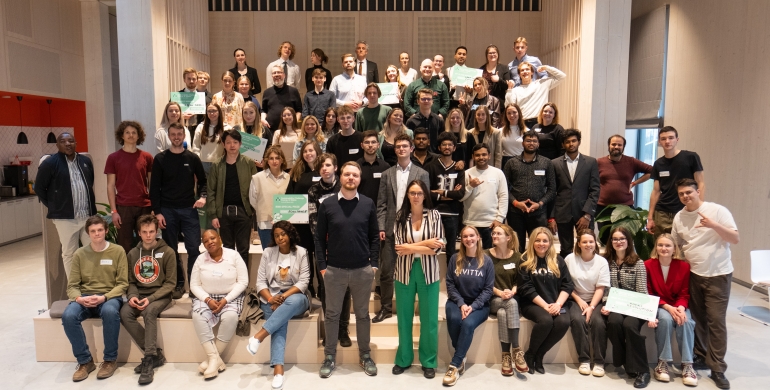In December 2023, the ESI student innovation program at the Stockholm School of Economics in Riga (SSE Riga) is concluded. Over two years, several courses, laboratories, incubators, webinars, and other activities were carried out to develop valuable skills in students, confronting them with real industry problems, providing access to leading professionals in fields relevant to their projects, as well as offering cutting-edge training to equip them with insights into strategic priorities at national and EU levels. The program aimed to develop competencies in socially responsible and environmentally sustainable business practices among future entrepreneurs.
Within the program's framework, 801 students from 16 educational institutions in Latvia improved their entrepreneurial skills by participating in various events and activities. For the most part, the events were organised in English, attracting 31% of international students among the participants. The program was divided into four thematic blocks, where students were exposed to different aspects of entrepreneurship – education, incubation, inspiration, and post-incubation support.
As part of the education block, participants could participate in 12 short courses with a combined academic weighting of 39 ECTS. Six business laboratories were implemented – two at the Stockholm School of Economics in Riga, two at the Rezekne Academy of Technology, and two in cooperation with SEB Youth Lab. Additionally, participants were able to get to know entrepreneurship from different thematic prisms by engaging in short courses – "Inclusive Startupreneurship”, "Social Entrepreneurship and Impact Investing", "Eco-innovation and Sustainability Management" and "Platform Strategy for new enterprises".
Thirty-six student teams had gone through the incubator in three batches. Two sub-streams were offered in the incubator, of which "PROTOTYPE IT" offered prototyping funding of up to 4,500 EUR. Startup ideas developed during incubation range from sustainable clothing to obtaining keratin from sheep wool to cat litter from fallen tree leaves to a tool for optimising electricity consumption, and many others. Graduates of this block could also take advantage of post-incubator support – information and assistance with finding and securing funding and further development opportunities after the completion of the incubator.
As part of the inspiration block, a range of activities were organized with the aim of inspiring students to consider socially responsible and environmentally sustainable entrepreneurship as a viable career path. Two major events were organized – ESI Sustainability Challenge and Impact Lab. In addition, 23 webinars and seminars with experts from industry and academia took place, including such prominent local startups as Longenesis, FIXAR, YoPlayDo, Nordigen.
The ESI program was also actively represented in existing industry events, such as the University of Latvia Icebreakers, Techchill Student Challenge, Racoons hackathon. An audio podcast - ESI "What's Next" - was launched, consisting of 27 episodes featuring participants of the ESI program, external experts in various subject areas, and different representatives of Latvian and foreign start-up ecosystems.
Dr. Dmitrijs Kravčenko, Associate Professor of Business and Management at the Stockholm School of Economics in Riga and Director of the ESI program, reflected on the work done: “ ESI program was a tremendous opportunity to support student entrepreneurship in Latvia in new and innovative ways. Innovation is at the heart of this initiative and at the heart of our consortium, so when designing ESI, we did not want to replicate another student startup incubator. Instead, our focus was just as much on educating future entrepreneurs as it was on providing them with a top-level environment for early-stage business development. This was made possible by leveraging the unique reach that SSE Riga has within the Latvian business environment and assembling an incredible team of industry mentors and partner organisations. We were exceptionally successful in this, and ESI remains the only program dedicated to fostering socially and environmentally responsible entrepreneurship at the University level. Indeed, we are delighted to have had the pleasure of working with students and professionals who care not only about their products and ideas but also about positively impacting the world and their communities. Being an agent of positive change is not usually the easiest path in life or in business, but it is the right one. This is the message we tried to communicate throughout the ESI program and it was an absolute inspiration to be part of it.”
The program was implemented by several leading higher education institutions in Latvia and the Baltic region – Stockholm School of Economics in Riga, Art Academy of Latvia, Riga Graduate School of Law, Rezekne Academy of Technology, Institute of Solid State Physics at the University of Latvia, Techhub Riga, Riga Techgirls, Social Entrepreneurship Association of Latvia, Zero Waste Latvia, Latvian Startup Association, CIVITTA, LETERA, SEB Latvija and RIMI Baltic. The program is co-financed by the European Regional Development Fund. Project number: 1.1.1. 3./21/A/008.a.


